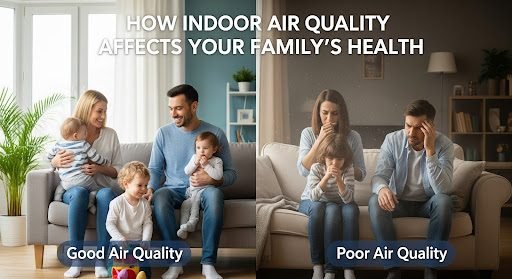Poor indoor air can be two to five times more polluted than the air outside, directly affecting your family’s health. From headaches and fatigue to worsening asthma and allergy symptoms, what you breathe indoors matters as much as what you inhale outside. Taking simple steps and consulting experts ensures your home stays safe and healthy. Learn how to improve indoor air quality with practical solutions from trusted professionals.
Why Indoor Air Quality Matters
Most people spend the majority of their time indoors, where contaminants and airborne particles accumulate quickly. Dust, pollen, mold spores, pet dander, and chemicals from cleaning products or paints can make the air stale and unhealthy.
Exposure to poor indoor air quality can cause:
- Respiratory issues
- Allergic reactions
- Dizziness and headaches
- Skin and eye irritation
- Chronic conditions like asthma, allergies, or COPD
Long-term exposure can even increase the risk of heart disease and certain cancers. Maintaining clean indoor air is essential for your family’s health, comfort, and overall well-being. Following indoor air quality tips can help you take control and reduce these risks.
Common Indoor Air Pollutants to Watch For
Understanding what contaminates your indoor air is the first step toward creating a healthier home environment. Several common pollutants can accumulate over time, affecting your family’s comfort and health.
Dust and Pet Dander
Tiny particles from household dust and pet hair can trigger allergies and asthma. Even if you don’t have pets, dust accumulates in carpets, furniture, and ventilation systems, carrying other pollutants with it.
Pollen
Pollen from trees, grass, and flowers can enter your home through open windows, doors, or on clothing. Once inside, it can exacerbate respiratory issues and cause sneezing, itchy eyes, or congestion, especially during high pollen seasons.
Allergens
Beyond dust and pollen, other allergens such as mold spores, cockroach residue, or certain food particles can circulate in the air. These substances can provoke allergic reactions, even in people who were previously unaffected.
Mold and Mildew
Moisture-prone areas like bathrooms, basements, and attics provide ideal conditions for mold and mildew growth. These fungi release spores that spread through the air, irritating the lungs and triggering allergic or respiratory responses.
Volatile Organic Compounds (VOCs)
Common household products—including paints, cleaning agents, air fresheners, and adhesives—emit VOCs. Prolonged exposure can cause headaches, dizziness, eye irritation, and may contribute to long-term health concerns.
Carbon Monoxide and Nitrogen Dioxide
Fuel-burning appliances such as gas stoves, heaters, or fireplaces can release carbon monoxide and nitrogen dioxide into the home. Even at low levels, these gases are harmful, potentially leading to fatigue, headaches, or more severe health effects if not monitored.
How Poor Air Quality Affects Your Health
Indoor air pollution can have serious health consequences, even over short periods. Here’s what to watch for:
Respiratory Issues
Particles like dust, pollen, and mold irritate your lungs and airways, leading to coughing, sneezing, asthma attacks, and difficulty breathing. Families with young children or elderly members should prioritize cleaner air and breathe healthier air with The Chill Brothers.
Allergy Flare-Ups
Allergens in the home can multiply quickly, triggering symptoms like itchy eyes, a runny nose, sneezing, and skin irritation. Even individuals without known sensitivities can experience health effects.
Increased Risk of Infections
Bacteria, viruses, and mold spores in the air can cause colds, flu, sinus infections, or more severe respiratory illnesses.
Headaches and Fatigue
Indoor air pollutants, including chemicals and harmful gases, can contribute to headaches, tiredness, dizziness, and difficulty concentrating.
Skin and Eye Irritation
Dust, pet dander, and other airborne debris can irritate skin and eyes, causing dryness, redness, and itchiness.
Practical Tips to Improve Indoor Air Quality
Improving indoor air quality does not require a complete home overhaul. With a few smart, consistent steps, you can make a noticeable difference and help your family breathe easier.
Upgrade Your Air Filters
A high-efficiency HVAC air filter is the first line of defense against indoor pollutants. HEPA or MERV 11–13 filters trap up to 99% of small particles like dust, pollen, and pet dander. Replace these filters regularly to ensure they remain effective.
Invest in a Whole-Home Air Purifier
For a deeper level of protection, consider installing a whole-home air purifier. Consult a professional to select the right system for your space. A quality air purifier reduces allergens, dust, and VOCs, helping you breathe healthier air with The Chill Brothers every day.
Maintain Optimal Humidity Levels
Humidity levels that are too high or too low can worsen air quality. Aim to keep indoor humidity between 30% and 50%. Use a dehumidifier in damp areas or consider a whole-home dehumidification system to maintain consistent levels.
Schedule Regular HVAC and Air Purifier Maintenance
Routine maintenance ensures your systems work efficiently and that filters and purifiers continue to remove pollutants effectively. Schedule professional checkups at least once a year, or more frequently if recommended by your service provider.
Limit Pollen and Outdoor Contaminants
During high pollen seasons, keep windows and doors closed to prevent pollen from entering your home. You can also wipe down shoes and clothing before coming indoors to minimize the spread of allergens.
Clean Smartly and Regularly
Vacuum your home using a HEPA-filtered vacuum and dust surfaces with a damp cloth to capture particles rather than spreading them into the air. Regular cleaning keeps dust, dander, and allergens at bay.
Choose Low-VOC or Fragrance-Free Products
Many cleaning supplies, air fresheners, and paints release volatile organic compounds (VOCs) that pollute indoor air. Switching to natural, low-VOC, or fragrance-free alternatives can significantly reduce chemical exposure.
Use Indoor Plants to Purify the Air
Plants such as snake plants, peace lilies, spider plants, and English ivy naturally filter the air, removing toxins and providing a healthier indoor environment.
Ventilate When Needed
Use exhaust fans while cooking or showering to remove excess moisture, smoke, and airborne particles. Proper ventilation helps maintain a fresh and safe indoor environment.
Monitor Indoor Air Quality Regularly
Finally, it’s important to regularly monitor indoor air quality with the help of a certified professional. Tracking pollutants, humidity, and overall air quality ensures that your environment stays safe and comfortable.
Following these indoor air quality tips consistently can make a noticeable impact on your family’s health, reduce allergy or respiratory symptoms, and create a safer, cleaner home environment.
Final Thoughts
Indoor air quality has a direct impact on your family’s health and well-being. Fresh, clean air helps maintain concentration, protect against illnesses, and support overall comfort. Conversely, stale, polluted air can cause numerous health issues, from allergies to chronic respiratory conditions.
Consult professionals like The Chill Brothers to assess your home’s air quality, implement expert-recommended solutions, and incorporate technology such as air purifiers, high-efficiency filters, and humidity control systems. By taking action today, you can breathe healthier air with The Chill Brothers and ensure a safe, comfortable environment for your entire family.
FAQs
What Are the Most Common Indoor Air Pollutants?
Indoor air pollutants include dust, pollen, pet dander, mold, volatile organic compounds (VOCs), and harmful gases. These can trigger allergies, respiratory issues, and long-term health risks.
How Can I Monitor Indoor Air Quality At Home?
You can monitor air quality using smart IAQ monitors or professional inspections. These devices measure particulate matter, VOCs, humidity, and temperature to ensure safe air for your family.
Do Air Purifiers Really Make a Difference?
Yes. High-efficiency air purifiers, such as HEPA or whole-home systems, reduce pollutants, allergens, and harmful particles, improving indoor air quality and overall family health.
How Often Should HVAC Systems Be Maintained For Clean Air?
Routine HVAC maintenance, including filter replacement and professional check-ups, should occur at least twice a year. Proper maintenance ensures consistent airflow, reduces pollutants, and extends system life.
Can Indoor Plants Improve Air Quality?
Yes. Plants like snake plants, spider plants, and peace lilies naturally filter toxins from indoor air and help maintain humidity, contributing to healthier air and a cleaner indoor environment.







